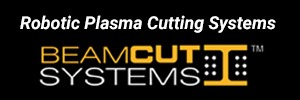Redefining Custom Sheet Metal Fabrication
Not much remains of an old metal fabrication shop that has radically revamped its manufacturing operations, lowered its costs, reduced its inventory . . . and repositioned itself as a serious competitor that is expanding into new markets.
Posted: July 30, 2014
Not much remains of the old Racine Metal-Fab Ltd. (Sturtevant, WI) – and that’s by design. Gone are the outdated manufacturing practices that have been replaced with a Lean philosophy to work more efficiently by removing wasted time and energy.
The autocratic top-down approach to communication has been abandoned in favor of a team empowerment concept. Even the decades-old building that was well past its prime has given way to a new modern facility that resembles anything but a stereotypical metal fabrication shop. The old ways of doing things are gone.
Now, Racine Metal-Fab is embracing a new Lean culture that ultimately positions the company to be more responsive to its customers. In the past few years, the plant has revamped its manufacturing to service its customers in a more economical, proficient manner, all while lowering costs and reducing inventory.
This Leaner culture connects with employees by empowering them to become more proactive in the way they approach and complete their work. These efforts have resulted in an organization that’s redefining itself to meet the needs of its customers today and in the future.
WINDS OF CHANGE
The push to change the company’s image began when Kim Nichols became chief executive officer in 2000. The Madison family founded the metal fabrication operation in 1968 in Racine, WI. For most of its existence, Racine Metal-Fab was content to be a quiet firm that carved out its niche in producing fabricated metal products for a select number of industries.
“We’ve never been proactive in talking about ourselves, but we realize doing that will help us grow,” Nichols said. “We’re looking to expand into other markets and to do that successfully, we recognized we have to change the way we do business.”
As management began setting more aggressive goals, it needed to ensure its manufacturing practices were up to meet the challenge. The old way of producing parts in mass quantity, often referred to as batch manufacturing, was standard practice at the Racine Metal-Fab and thousands of other plants across the country.
The idea behind batch manufacturing is that parts are produced in mass quantity by creating them stage by stage over a series of workstations. The problem is that producing parts in bulk leads to increased inventory in both raw materials and finished goods.
Inventory costs money, is susceptible to damage, can quickly become obsolete and also takes up space. For Racine Metal-Fab to grow its brand into new markets and meet the needs of its customers today, leadership realized its manufacturing procedures needed an overhaul.
The drive to become Lean accelerated when the company brought in Scott Lucas as its president and chief operating officer in 2009. Lucas was no stranger to Lean environments; having successfully transformed another plant’s manufacturing practices to become more efficient prior to joining the Racine Metal-Fab.
“When I came here in 2009, we were in the heart of the recession, and it would have been easy not to go to lean,” Lucas said. “If you want to grow and stay competitive, especially in the world we compete in, you have to adapt and do things smart and more efficiently.”
Lucas was joined on the management team by Ralph Fechhelm, who came onboard as Lean manager, and later became the director of operations. Like Lucas, Fechhelm brought a strong Lean-focused philosophy to the organization. Other leadership and supervisory positions were added as well to aide in the transition to lean.
“One of the things I focused on doing was hiring a very professional team that embraced the Lean principles we were looking to initiate here,” Nichols said. “I set the direction and got out of the way to let them do their magic. We have been successful as an organization because of the team that’s in place now.”
EXECUTING THE PLAN
Launching the Lean concept received a strong shot in the arm when the company moved into a new 75,000 sq ft facility in 2012. The previous building was a typical metal fabrication facility – it was dark with few windows, low ceilings and by all accounts, not very inspiring.
“A new building was a bucket list item for me,” Nichols said, adding the new facility with its high ceilings, air conditioning throughout the plant and windows to let in the sun has proved to be a valuable recruiting tool. “We wanted to create a more inviting place for our team. I want great people to come here and enjoy going to work.”
For a Lean concept to take root at Racine Metal-Fab, rearranging the plant was in order. The previous floor plan wasn’t conducive for employees, machinery or stocked materials to effectively operate. Pallets and other equipment were constantly being moved to access the desired materials – a process that could take 30 minutes or more just to get a job started. To address this, the plant was redesigned to bring materials closer to each manufacturing cell.
Leadership performed an audit of each cell to determine what equipment and materials were needed to complete any job. Today, it’s common to see a punch press, laser, brake press and tooling located right inside a cell; everything required to finish a job with only one or two people is readily available. Previously, those three pieces of machinery might have been in separate locations throughout the plant. Cells have all the steps needed to do the job from start to finish.
The process of explaining and demonstrating Lean principles to a workforce engrained in the batch mentality was another component that needed to be addressed. At the core of Lean manufacturing is starting and finishing a job in one continuous motion, i.e. when a job is started, that work will continue until it’s finished – a practice also known as one-piece flow.
“Going Lean is a whole new mindset. Getting people to understand that has been challenging at times, and some aren’t here anymore,” Lucas said. “If you give them enough training, tools and support, they’ll take the ball and run with it. Once you get people involved and participating, it starts to move faster.”
One of the goals Racine Metal-Fab set when launching Lean is to further empower employees by being trained in multiple areas and disciplines – a strategy that is key for Lean to be successful at the company. “When our team members can do multiple things, they’ll be more productive to us because then we don’t have people just doing individual things,” Lucas said. “They’re intimately involved in the flow of work and are encouraged to give their input. Plus for them, the more they can do, the more they can earn.”
PROMISING RESULTS
The results of the transformation to Lean are having the greatest impact on its customers. In the few short years since instituting Lean, the company has reduced its lead time on orders to about five days. Through the collective efforts of reducing waste in the overall manufacturing process, the plant is able to turn around orders quicker than ever before.
“Lean is a continuous process; we’re always looking for ways to improve even further in order to help our customers meet their specific needs,” said Scott Oechsner, the director of marketing/business development at Racine Metal-Fab. “Our customers need us to do this to ensure their success and, in the process, ours as well.”
Another benefit to its customers is through prototyping of product. Tim Peters, purchasing manager, Musco Lighting, said being able to get product prototypes back from Racine Metal-Fab in just a few days as opposed to three or four weeks is a great time-saving option for its research and development.
“That’s something we look for in a partner, someone who can respond to our needs,” Peters said. “They have quick response time and a quick turnaround even on low volume orders. We’re pushing and challenging them to improve even more. Racine Metal-Fab is the type of organization that understands the value of a true business partnership.”
Musco Lighting, which specializes in sports lighting systems, has been purchasing a variety of reflective metal products and other components from Racine Metal-Fab for more than 25 years. Moving forward, Racine Metal-Fab is aiming to reduce lead time even further, and to do that, it will take a team effort that continues embracing Lean principles.
“We have been successful because of the entire team,” Nichols said. “It’s been my focus to get the team in place, work with them on refining the strategy and then let them go and trust that they will do their best. I think people want to have responsibility and to be part of something bigger. That’s what we’re doing here.”
Racine Metal-Fab, Ltd., 1520 Grandview Parkway, Sturtevant, WI 53177, 262-554-1140, Fax: 262-886-2723, www.rm-f.com.
















